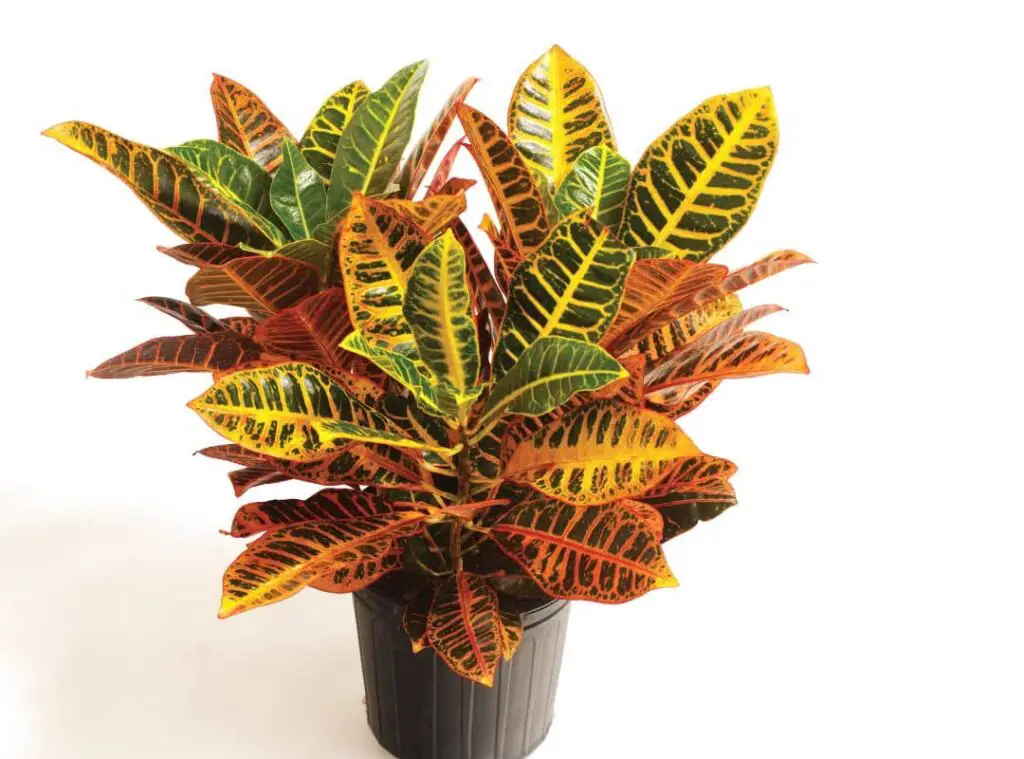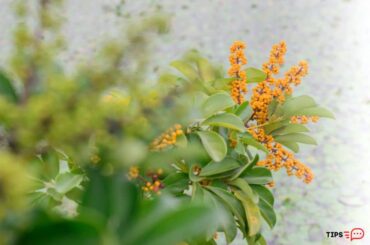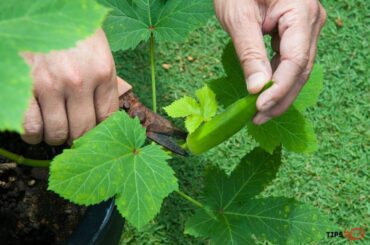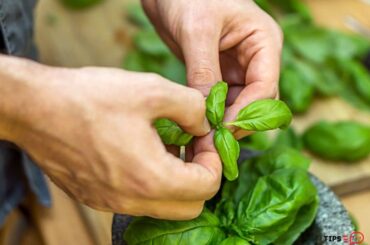Croton plants are yet another low maintenance and easy growing house plant. However, fertilizing the croton is a very crucial factor when it comes to ensuring a healthy growth of the plants. So, from this article I am going to address the croton plant fertilizer requirements and the best fertilizers you could use for them.

Generally speaking, croton plants prefer to have a liquid fertilizer which has a NPK ratio of 3-1-2. Croton plants have a higher demand in terms of fertilizing.
Thus, you need to feed the plants with a proper fertilizer once a month when they are at the active growing phase. You may also use either compost or organic fertilizers during the rest of other periods to feed them.
So I have covered all the details you need to learn on croton plant fertilizer. Literally we will be covering the best fertilizer type you could use, how frequently you could use the fertilizers and how to fertilize them etc.
Why is fertilizing Crotons important?
Croton are heavy feeders as aforesaid. They need a sufficient amount of nutrients as it would contribute for a healthy growth specially during their active growing season. Many people tend to use a potting mix which is enriched with nutrients to encourage the plants healthy growth.
However, as the plants grow, soil mix would tend to deplete their nutrients and you would want to apply fertilizers externally. So, I encourage the plants with fertilizers from time to time.
If the croton plants run short of nutrients, they would get fragile. After some time, it would be difficult for them to thrive. Later on, they would give up growing any longer too. Once they start lacking sufficient nutrients you would see how they suffer with weak stems, faded foliage etc.
In addition to that, they would further develop leggy growths as well. Not only that but also, you need to feed the croton plants properly as unless they would have stunted growth, weak roots , small leaves and at last dropping leaves too.
If you spot your croton plants, come up with any of these signs, it literally means the plants are running short of sufficient nutrients and you need to feed them at that time itself.
If I briefly explain these signs further, you would see your croton plants don’t form new leaves faster. Further when they do, those new leaves would not take the same size as the regular leaves would.
Furthermore, the colors of the leaves would also tend to discolor and tend to take a pale green to yellow color. So, if you have cared for the plants well it would be most probably due to a nutrient shortage. Generally, the croton plant leaves would be thick, leathery. On the other hand, the plants lacking nutrients would be carrying soft and tattered leaves .
What nutrients do fertilizers have?
Before proceeding with fertilizing your plants you need to first check what fertilizers your croton plants need and how they impact healthy growth in the plants etc. Croton plants require both micronutrients and macronutrients.
Both these nutrient types contain minerals which are quite crucial for a healthy growth in the plants. If I further elaborate on these, macronutrients are crucial for the croton plants development and for the growth.
Croton plants need to have three main macronutrients such as Nitrogen, Phosphorus and potassium. You could call these as NPK. Apart from these, Croton plants need other macronutrients such as Sulfur, calcium, Magnesium carbon oxygen and lastly Hydrogen as well.
On the other hand, croton plants require micronutrients such as Boron, Manganese zinc Iron and copper to grow vigorously. However keep in mind that you need to provide these micronutrients in minimal amounts. Avoid feeding them with these nutrients in large amounts as they would only want a minimal amount of these.

What is the best fertilizer for crotons?
Choosing the best fertilizer to feed the croton plants is very crucial when it comes to feeding the croton plants. In fact, croton plants do not want a balanced fertilizer.
You can either use fertilizers which have a 20-20-20 or 3-1-2 ratio. I encourage you to use a fertilizer which has the 3-1-2 ratio as it would be the best fertilizer for these plants. if you use the first fertilizer it would contain more potassium levels.
On the other hand, the second fertilizer would carry more nitrogen levels. Overall, I suggest you choose the fertilizer depending on the soil mix quality. So don’t ever think that croton plants need to have fertilizers which have a balanced ratio like most other plants.
If we explain how these nutrients help the plants to grow vigorously, Nitrogen is a vital nutrient in assisting the photosynthesis process to conduct effectively and in boosting a foliage growth. Phosphorus is a crucial nutrient for a firm root formation.
Lastly, Potassium is crucial for maintaining a right water balance of the plant materials and in strengthening them as well. Don’t use any fertilizer which has a higher component of phosphate as it is a nutrient which you need to use on flower blossoming plants.
It is noteworthy that you need to always go for acid producing fertilizers as they would suit these plants. For example you could use fertilizer which you usually use for azaleas and for gardenias.
Types of fertilizers
There are three main types of fertilizers such as Granular fertilizers, slow release fertilizers and liquid fertilizers.
Granular fertilizers
Granular fertilizers would come in little pieces like pellets. You could add these fertilizers directly to the soil. However I urge you to add these fertilizers only for the outdoor grown croton plants. They would immensely provide nutrients and could be very beneficial in promoting vigorous root development. However if you over supply these, chances are that it would burn the plants.
Granular fertilizers contain high levels of nitrogen, potassium and chances are that they would end up over fertilizing your plants most of the time. So, I don’t recommend using these on the indoor grow croton plants as they would be quite sensitive towards those.
Slow-release fertilizer
Slow release fertilizers are breaking down slowly when you water the plants and release the nutrients at a slow pace. I suggest using these on outdoor plants mainly. I don’t recommend using these for the croton plants as we cannot control the nutrients of the plants.
Liquid fertilizer
Liquid fertilizers are one of the most convenient forms of fertilizer for the croton plants. This would be a fine way of feeding the indoor grown croton plants in particular. There is a powder formation of these fertilizers, and you could simply mix it with water and make it a liquid fertilizer and then feed the plants.
This is one of the best fertilizers you could use to feed the croton plants as it is very unlikely that it would result in any over fertilization. In fact you could simply control the nutrients you need to provide for the croton plants. If the fertilizer has higher levels of nutrients you may simply mix them with water and then feed the plants.

Best recommended Fertilizer for Crotons
Miracle-Gro Water-Soluble All-Purpose Plant Food
If you wish to go for a cheap yet best kind of fertilizer, I suggest you use Miracle-Gro Water-Soluble All-Purpose Plant Food. This would work with many houseplants, be it vegetables, trees, shrubs or flowers. Further you could use the Miracle-Gro Water-Soluble All-Purpose Plant Food fertilizer on both indoor grown and outdoor grown plants as well.
Best would be to feed the croton plants with Miracle-Gro Water-Soluble All-Purpose Plant Food once every month during their active growing phase. However, the prescribed instructions would be to feed them once every two weeks. Furthermore, I recommend you feed the croton plants once every two months during the colder conditions.
Miracle-Gro Water-Soluble All-Purpose Plant Food has a appropriate NPK ratio as well. In fact it has a 24-8-16 ratio which literally means it has a 3-1-2 ratio of the three main nutrients.
You could spot these fertilizers coming in numerous sizes such as 8 oz, 1.5 pounds, 3 pounds and 5 pounds and 10 pounds. So, if you don’t have a lot of plants to feed you could go ahead with the smaller size.
Dyna-Gro Foliage Pro
Dyna-Gro Foliage Pro would be excellent for tropical foliage croton plants. This is a 9-3-6 fertilizer, and it literally means it has the ratio of 3-1-2. This contains all 16 minerals and they are quite crucial in assuring an optimal growth of these plants.
However Dyna-Gro Foliage Pro fertilizer is somewhat costly and not everybody can afford it. However it is very easy to use them. If you have a liquid concentrate you only have to use ¼ tablespoon per gallon.
Dr Earth Organic & Natural Exotic Blend
Dr Earth Organic & Natural Exotic Blend doesn’t contain the 3-1-2 NPK ratio. However I still recommend using this as it would perfectly fit in for exotic croton plants.
In addition to croton plants, you could use this for palm plants, tropical plants and for hibiscus as well. Dr Earth Organic & Natural Exotic Blend fertilizer has a 5-4-6 ratio. However, that doesn’t matter a lot.
Dr Earth Organic & Natural Exotic Blend contain 4 % humic acid and that characteristic would make them a perfect choice for croton plants. As aforesaid, croton plants would prefer having acid producing fertilizers.
Furthermore, Dr Earth Organic & Natural Exotic Blend has magnesium and sulfur which are two more crucial nutrients for the crotons to thrive well. Dr Earth Organic & Natural Exotic Blend has affordable prices.
Miracle-Gro Indoor Plant Food (Liquid)
Liquid formation of Miracle-Gro Indoor Plant Food is another fine way of fertilizing the croton plants. It is very easy to use as well. You simply have to pour them into the water. You could either add these to the water and feed or apply them directly on the soil.
If you wish to apply them on the soil, you can simply use 01 pumps of these for the small croton plants. On the other hand, if you have large croton plants, you may increase it up to 2 pumps of these. If you want to add it to water, you can add 4 pumps per quarter of water.
What is more special about the Miracle-Gro Indoor Plant Liquid Food is that it would instantly feed the croton plants. Further keep in mind that you could apply it on your edible crops as well. Literally you could consider the Miracle-Gro Indoor Plant liquid food as an all-purpose fertilizer which you could use on indoor plants.
Frequency wise, you could feed the plants just once a week. Having said that, you can use it less often too. During winter you could feed the plants once every two months with this. If you have dying croton plants, Miracle-Gro Indoor Plant liquid food is the one you should try out. It would assure a healthy growth in the plants.
Earth Pods Hibiscus & Tropical Flower Formula
Earth Pods Hibiscus & Tropical Flower Formula is somewhat an expensive fertilizer. Thus, if you have so many croton plants, I don’t ask you to go ahead with this option. However, if you have a few croton plants, It would be really worth investing in this as it would be worth trying it.
Earth Pods Hibiscus & Tropical Flower Formula would come in forms capsules and you can simply insert them to the soil and water them as you would usually do. Earth Pods Hibiscus & Tropical Flower Formula is organic and it would justify the high prices of them.
Don’t apply the Earth Pods Hibiscus & Tropical Flower Formula capsules in winter as the croton plants don’t need them during winter. However I urge applying these during spring and summer as it would be beneficial for the optimal growth of the croton plants during those periods.
As per the manufacturer’s advice, you could use these capsules once every two to three weeks. However, if you have a plenty of croton plants to feed, you could feed them less often as anyway they would last for a longer time.
Small croton plants would want 1-2 Earth pods. Further you may use 2-4 earth pods for the medium plants. Lastly you could use 4-8 earth pods for the larger croton plants.

Can you use compost as a Croton plant fertilizer?
You could use compost to feed the croton plants. There could be some plant lovers who don’t prefer using chemical fertilizers as they contain a toxic content.
So, you could use compost which is made out of organic matter to feed the croton plants. For example, you could use compost which is made out of dry leaves, clover, grass clippings and food scrap etc. You could directly apply the compost on the soil as they would keep nourishing the plants while breaking down slowly.
Having said that, keep in mind that croton plants heavily depend on fertilizers and compost don’t comprise all the essential nutrients that your croton plants would want. So, if you use compost solely on the croton plants, it would not be healthy on the optimal growth of these plants.
One more disadvantage of using compost on your croton plants is that you would not know how much nutrients your crotons are getting. Further, there is no way of controlling that as well. However, don’t depend on compost solely as it would not be sufficient for the plants growth.
Do crotons like coffee grounds?
Many plant lovers opt to use coffee grounds to feed the majority of the houseplants. In fact coffee grounds would be ideal to feed the plants which prefer to stay in acidic soil. In that context, you could fertilize the croton plants with coffee grounds and there is no issue in using coffee grounds for your precious crotons.
However I don’t encourage applying the coffee grounds directly into the soil since it would be harmful for the plants vigorous growth and it could even burn the roots.
To use them all you have to do is mix them either with compost or with liquid fertilizers. If you wish to use the coffee grounds along with liquid fertilizers, you need to soak the coffee grounds in water for about one week’s time and then apply.
This would be a fine way of boosting a healthy growth in the crotons. However I don’t recommend using this if you already have an acidic soil as it would enhance the acidity in the soil and cause severe damages for the plants.
How much fertilizer do crotons need?
Even though crotons are heavy feeders, they would only want a small amount of fertilizers to grow optimally. Hence don’t ever apply high doses of fertilizers as it would bring so many adverse effects on the plant’s health.
So, if you have a liquid fertilizer, you need to mix it with normal water and then apply it on the soil. This way you could avoid any potential over feeding which would take place.
How often should you fertilize crotons?
You need to fertilize the crotons once every two to three weeks during spring and in summer. These seasons are their actively growing seasons.
Crotons would go dormant during winter and best would be to either suspend feeding them at all or feed them less often. In fact, feeding in winter would vary depending on the temperature levels and on the lighting levels as well.
Literally if the weather is not too cold and if the plants are gaining ample sunlight, you could feed them once every two months with a small dose.
However if the weather is too cold , best would be to keep the fertilizers off from the plants. Don’t apply too much fertilizers as it would not be healthy on the plants. What is important is to keep monitoring your precious plants and observe whether you need to feed the plants or not.
How to fertilize crotons?
Fertilizing the crotons is not a complex task at all. However before you feed the plants you need to first make the soil moist. Don’t use the dry soil as they would not be able to absorb the fertilizers. Next you need to choose the right fertilizer type which has a right NPK ratio to feed the plants.
Next mix it with water so that it would increase the consistency of the soil mix. Thereafter you could apply the soil mix to the soil. If you are using coffee grounds best would be to dilute it with water and then apply.

What happens if you over fertilize crotons?
One of the most commonly spotted issues when growing the crotons is over fertilizing them. One might not know how much fertilizer they need to apply for the crotons. So, most of the time they would end up feeding the plants in excess while paving the way for repercussions of over fertilizing.
If your plants are over fertilized, you would see how they develop brown tips and brown spots on the leaves.
Furthermore, there would be white crust appearing on the soil surface as well. In addition to that , you could witness crotons bearing yellow leaves and wilting leaves as well.
Lastly , once you overfeed your precious crotons , they may tend to show a stunted growth pattern as well. Best thing to avoid over fertilizing is to mix the fertilizer with water and then apply.
How to fix over fertilized crotons?
If you end up over feeding the crotons, you could fix it by pruning the damaged and the affected plants parts first. Further try to remove the top layer of the soil. Next wash the soil by applying some water so that excess fertilizer can move out from the containers.
Furthermore I recommend repotting the crotons using a fresh soil mix as well . However you need to take off all the injured roots prior to repotting the plants and ensure that they are bearing only the healthy roots. Once the plants seem to be okay, you could continue feeding the plants like you used to do without over feeding them.
Slow-Release fertilizer vs Regular fertilizer
If you wish to use a slow release fertilizer, you could resume feeding the crotons in late February , early march. Next you can feed them once again in May and in July. It would allow you to avoid feeding them in autumn and they can go dormant in winter without any issue.
If you are using slow release fertilizers, you could skip feeding the crotons in winter. On the other hand, if you use regular fertilizer such as granular and liquid plant food, you can feed the plants monthly if the labeled instructions are such. Further you may feed the croton plants with regular fertilizers once every two months during winter.
Conclusion
Crotons are heavy feeding plants. However, you need to ensure that you don’t provide fertilizers in excess at once. They would want numerous nutrients to grow optimally. Regular fertilizing is important as It would allow the plants to gain sufficient nutrients without over fertilizing as well.
To sum up, fertilizing the crotons is not a complex task at all as long as you choose the right fertilizer type and feed them with the right amounts.
Read Next : Does Dragon Fruit Make You Poop? Odd Facts




